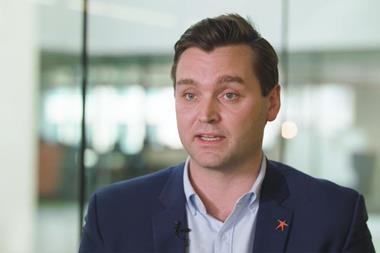In association with

In this video, HSJ correspondent Alison Moore sits down with Frank Chinegwundoh, consultant urological surgeon and chair of Cancer Black Care, and Oliver Kemp, CEO of Prostate Cancer Research UK, to discuss the challenges around delivering equitable cancer care and why it is important to distinguish between equity and equality. This includes tackling the disparities in cancer screening uptake and the importance of tailoring health messages.
This episode was filmed in April 2025, before the publication of the NHS 10-Year Health Plan.
Alastair McLellan
Welcome to the next episode of our Cancer: Project Zero video series. HSJ has teamed up with AstraZeneca to host a series of discussions on advances in cancer care. We’re exploring a possible future in which no one dies from cancer. In this episode, we’re exploring the challenges in delivering equitable cancer care. Our expert guests will examine the disparities that exist for people with cancer and the innovative solutions being proposed to bridge those gaps. HSJ correspondent Alison Moore spoke to Professor Chinegwundoh MBE, honorary visiting professor in health sciences at City University London, and Oliver Kemp, CEO of Prostate Cancer Research UK.
Alison Moore
Could you tell us a little bit about the difference between equity and equality, and why this is important in cancer care?
Frank Chinegwundoh
Yes, certainly. I think equality, as you mentioned earlier, is treating everybody in the same way, but people have different needs and people have different understandings. And so equity is really, the idea behind that, is to address those things. So, for example, if you send everyone a leaflet about, I don’t know, bowel cancer screening, for example, then if you can’t read or English isn’t your first language, then you’re not going to absorb that information and act upon it. So it’s equal in the sense that everyone’s had the same information, but it’s not equitable because a certain group may not be able to understand and absorb it. And clearly, if you don’t understand what it is, the information that’s being given to you, you’re not going to be able to act upon it. And so, when it comes to something like screening where, for example, if you’re sent the information. So for example, colon cancer screening, where you’re sent a kit and you have to take a sample of your poo and send it off, if you don’t, if you can’t understand the instructions, or you’re not familiar with the whole idea of screening, then you’re not going to partake of that, meaning that in the segment of a population, the screening uptake is going to be lower. So to make it equitable, we have to find other ways of getting that information across to certain groups so as they can understand it and act upon it and get their screening up.
Alison Moore
And we do see that in practice, don’t we, with certain groups having very low uptake of screening, even when they receive the same information or the same kit through the post. We know that Black women, for example, are less likely to have a mammogram for breast cancer screening. We know that Black men, although they may be at higher risk, may be less likely to come forward for testing there. So for cancer clinicians, this must be a real, very real issue. You must be seeing people present later in the course of the disease, and therefore, presumably, there’s a worse outcome for them.
Frank Chinegwundoh
Yes, I mean, it’s well recognised that earlier diagnosis leads to better outcomes. So clearly, if you present with advanced disease or disease that has already spread around the body, then you’re not going to fare as well had you presented earlier. So if you’re receiving information and you don’t understand it, or you don’t understand the concept behind it, then you’re not going to present early. So, one of the things that I found in my work as chairman of the charity Cancer Black Care is that a lot of people don’t actually understand the concept of screening. So you go to a doctor when you’re ill. You don’t go looking for trouble, as certain people have put it to me. So the idea of being perfectly well, perfectly healthy, and you go along for a test that might show otherwise, that’s a kind of an alien concept to several people. So one of the things that we try and do is to explain the importance of screening and how that can lead to an earlier diagnosis than would otherwise be the case, and therefore, your outcomes are better. So there is work to be done in terms of explaining the concept of screening to people who may not fully understand it, and encourage them and work out ways of getting them into whatever screening program it is we’re talking about.
Alison Moore
And Oliver, I think this very much relates to the work that you’re involved in on prostate cancer, where the experience of different groups in society can be very variable. Could you tell us a little about this?
Oliver Kemp
Yes, so I think particularly in regards to the campaign that we’re currently running, we’re trying to ensure that high risk groups are screened and get a letter through the post and say we’d like you to turn up here at such and such a date and have a test for prostate cancer, because we are well aware that the current system is failing. Informed choice and presenting at the doctor requires people to be knowledgeable about prostate cancer. Most men don’t know where the prostate is, and that figure plummets depending on your social, levels of social deprivation. So if socially deprived areas is often less knowledgeable about the prostate and about prostate cancer, but also the feeling of empowerment and being able to feel like you can challenge your doctor and have a two-way conversation openly, also plummets. So, people who are incredibly knowledgeable and incredibly empowered are far more likely to end up with a PSA test and therefore have their prostate cancer diagnosed earlier. So we do see really significant differences, both on racial equity, but also on social equity, where places like Blackpool people are dying seven years earlier than places like South Cambridgeshire, and that’s something that we must do something about, and must be in the benefit to the benefit of the NHS. If we’re catching cancer later, it’s more expensive, it costs more money, it’s harder to deal with, we’re taking up valuable resources for something that could have been caught much earlier.
Alison Moore
And Oliver, I’m really interested in this idea that there are certain populations where we could intervene more effectively. What are some of the challenges around that at the moment? For example, are we able to actually pinpoint areas where there are a large number of people who are not coming forward for PSA?
Oliver Kemp
Yeah, so right now we get, we can get a good sense of what’s happening in a region, but we have no granularity of detail about what’s happening with specific target groups that we’re trying to reach, or what demographics we need to try and work on, whether there are particular racial groups that we want to try and reach, and what is working to actually get them to come forwards. So one of the things that we’re doing at the moment is a huge database, working in conjunction with the NHS. Prostate cancer research was the first driver project. So we’re working with three regions of the country, 24 million people, and we’re going to overlay that with patient reported outcomes and experience measures, so we can actually see what’s happening in real time and see where there are particular problems. But right now, you could say, okay, well, we know that Great Yarmouth is particularly struggling, but we don’t know what the experience of a Black man in Great Yarmouth is like compared to a white man in Great Yarmouth. We’ll be able to understand that in minute detail of what their experiences is, what their experiences are, what the diagnostics that they’ve gone through are, how long it’s taken for those diagnostics to be delivered, how long it’s taken for treatment to be provided, whether their cancer was caught late or early, and what their outcomes are. We’ll have all of that granularity of detail. And of course, that’s what we need to be able to influence change, because you can’t go forwards and say, well, we’d like this change, but we don’t know what’s needed. We’ll have all the information that we can deliver to local community based organisations, to local NHS trusts, and say, this is where we think we can make the most change for the least amount of money, and this is the most cost effective change you can make in this area to deliver change.
Alison Moore
That sounds a really powerful set of data.
Oliver Kemp
Yeah, it’s been four years in the making, but it’s going to be fantastic to be able to arm local community based organisations with the information they need to influence policy change.
Alison Moore
Right. What does this mean for the NHS’s approach to screening, which can sometimes be fairly blanket in terms of how people are given information, invited for screening and so forth?
Oliver Kemp
Well, I mean, I would argue that we’ve got to go further than, as Frank says, just kind of sending a letter through the post and expecting everybody to do the same thing. We saw during covid, when we take specific action into a community and really try and understand the community, work with community based organisations, deliver the right messages in the right way at the right time, then you can get the uptake. It does work if we do it in the right way. So I think when we design something that’s trying to reach a specific community, let’s design it with that community. Let’s design it with trying to get to a point where we’ve got greater levels of equity. So I would argue that we need a different approach for different people.
Alison Moore
Would you agree with that, Frank?
Frank Chinegwundoh
Yeah, absolutely, I think Oliver is entirely right, and there are good examples of where this has been done in the NHS. So, for example, some years ago, there was an NHS campaign called Be Clear on Cancer and this covered various symptoms that might indicate a risk of having a particular cancer. So, for example, if you had a campaign said you’ve had blood in your urine, then you should go and see a healthcare professional. If you had a cough for more than, I think it was three weeks or something, then go and see somebody. And so there were a series of symptoms, and what the NHS did at that time was that they, the way they marketed this and advertised this and got the message across was segmented. So there was an agency which had experience of delivering messages into different communities was hired and developed specific posters according to which communities they were targeting. And one of the things that was quite successful was that, for example, in the Black and ethnic minority groups, they would get people such as myself and others who were kind of reflective of the people who were trying to get the message across to. Also used various media outlets. The Voice newspaper, for example, there were various Asian TV stations, various Black radio stations. And so what the NHS did in this Be Clear on Cancer was get inroads into community by using trusted messengers, by using the media in that way, and it was very successful in when it was evaluated in terms of the signs and symptoms of various cancers being recognised and being acted upon. And it’s, you know, it turns out, for example, if you put an advert on, I don’t know, the mainstream television channels, a lot of people don’t actually access those channels. You know, the various ethnic minority channels that people are far more likely to look at and now, of course, in days of social media and so on. So I think when you’re trying to deliver health messages that will get people to act, you have to think very carefully as to where you put those messages into.
Alison Moore
There’s obviously a lot in that that the NHS could take on board. What sort of things would you like to see happen? We’re obviously coming up to having a new cancer plan. We’re going to have the NHS Long-Term Workforce Plan and also the NHS 10-Year Plan in the next few months. But what would you say to the people who are drawing together those plans? How could they actually improve screening such that we are reaching all parts of society?
Oliver Kemp
You know, I think that the messages that are coming out from all of those plans are we’ve got to catch cancer early. With prostate cancer, you’ve got 100 per cent chance of survival if you’re catching cancer, if you’re catching at stage one, compared to less than 50 per cent if you’re catching it at stage three or four. I think everybody recognises that we’ve got to get people earlier in the pathway to save as many lives as possible. So I think the message that we would have is okay, these particular high-risk groups, Black men, men with a history, with a family history, those are the groups where you’re going to make the most difference, and where we should focus first, and that we have to design a system for ensuring that we find those people. Sometimes getting family history is difficult, for example, so we’ve got to design a system that gradually builds up more information and delivers targeted messages to those groups to say you are at greater risk and you need to come forward, and this is in your best interests, because it’s going to catch up with you if you don’t.
Alison Moore
And Frank, are there changes that you would like to see as well?
Frank Chinegwundoh
There are changes, you know, I think, as Oliver said, we need a, you know, a screening program, and I would advocate in terms of prostate cancer that we should be instituting now a national screening programme for all. In the absence of that, then a targeted screening program targeting those high-risk groups, those with a genetic predisposition, family history and Black men. But I think even before that, we can do something very easily, even before a targeted screening program, which is to change what is called the Prostate Cancer Risk Management Programme. So this is a document that every GP has been sent on a regular basis since 2011, and in this document, unfortunately, it does not encourage GPs to be proactive in terms of asking men about the potential risk about prostate cancer. So I think a very simple tweak to this Prostate Cancer Risk Management Programme, which will go to every GP in the land, would say, if you see a man of the appropriate age, and we can discuss what age that should be, be proactive and ask them about prostate cancer, and be proactive in sending a PSA off – that’s a prostate cancer kind of blood test – rather than, as I said earlier, relying on the man to know about it and then approach you. You should, you know what I’m calling for, which is a very easy tweak, is to encourage GPs to be asking those questions. And in fact, I think it was last year, or possibly the year before last, Prostate Cancer UK did a very interesting project where, in Bristol, they got several GPs on board and what those GPs did was looked at their registers of men of the appropriate age group and invited them in to have their PSA screening. And the uptake amongst the men was very good indeed. So there’s things that we could do right now.
Alison Moore
Yeah, relatively simple things as well.
Frank Chinegwundoh
Yes, and not overly expensive.
Oliver Kemp
PSA test is about £25. Cost of saving somebody’s life, it’s minuscule.
Alison Moore
Yes, indeed, and obviously, HSJ readers who are listening to this would like to know what they could do at the moment, rather than having to wait for some of the big national initiatives, which I’m sure you hope are coming. What would you say to them when they’re working in hospitals or in community services? Are there changes that they could instigate?
Oliver Kemp
I think one of the things that we haven’t talked about is new innovations, and those innovations are coming on stream pretty fast. There are new blood tests. There’s AI that could be added into MRI machines, all getting better and better all the time. I’d love to see more of those piloted and rolled out, so that we can actually get that specificity and sensitivity, the accuracy levels up, so that we can reduce the overtreatment, the overdiagnosis risk, and less people end up in biopsies, which are obviously invasive, and all those types of things. We’re getting to a point where people are less scared about the going and getting tested would make a huge difference to the communities.
Alison Moore
And Frank, and you’ve mentioned what can be done in GP practices. Are there things that can be done in hospital services?
Frank Chinegwundoh
I think there’s things that the ICBs or the integrated care boards can do, and we have examples, for example, in north east London, where there was an initiative to offer PSA testing to men in the community, and several hundreds of men, when they heard about this, took advantage of being able to have a PSA blood test without having necessarily to go via the GP. So I would like to see NHS workers or HSJ readers approach their integrated care boards and say, what are you doing to raise awareness about prostate cancer in your jurisdiction, and should you be doing something? Should you be more proactive in terms of trying to find men earlier and make an earlier diagnosis of prostate cancer?
Alastair McLellan
Thank you, Frank and Oliver, for that insightful overview of the challenges we face in reducing inequity in cancer care. It is clear if we wish to get close to a world in which zero people are dying from cancer, there is lots that still needs to be addressed. But it is reassuring to know that there are lots of encouraging advances we can learn from. Please do join us for the next episode in AstraZeneca’s Cancer: Project Zero campaign.
The views expressed are those of the individuals and not those of AstraZeneca or any other organisation
To find out more about AstraZeneca’s Cancer: Project Zero campaign, click here.
June 2025 GB-66394
Topics
WATCH: Is precision medicine the future of modern cancer care?

Welcome to the first video in our series, created in collaboration with AstraZeneca for Cancer: Project Zero.
- 1
- 2
- 3
 Currently
reading
Currently
reading
WATCH: How to redesign cancer care to address inequity
- 5









































